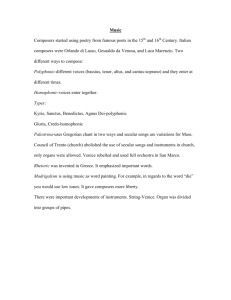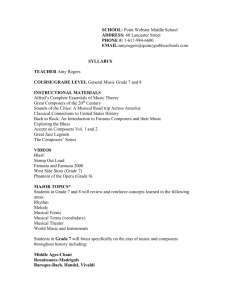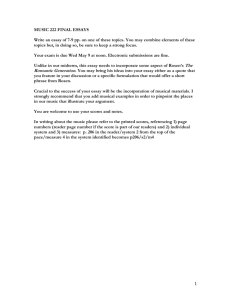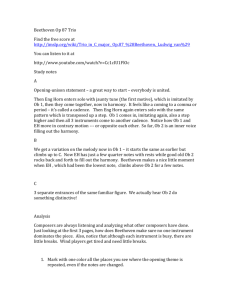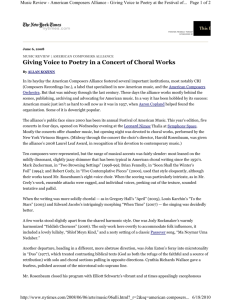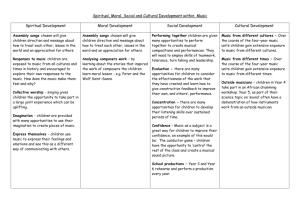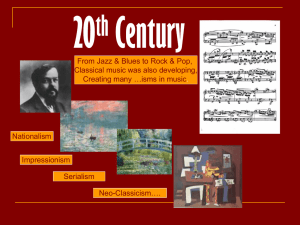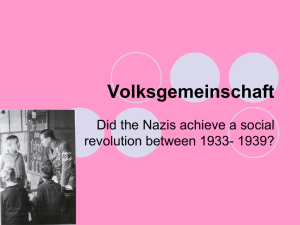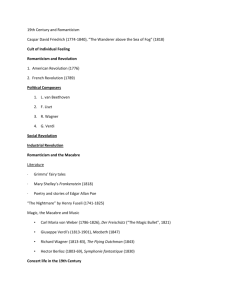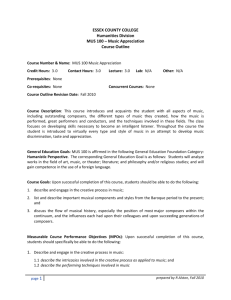Collaboration, Dissemination, and Emigration: How World War II
advertisement
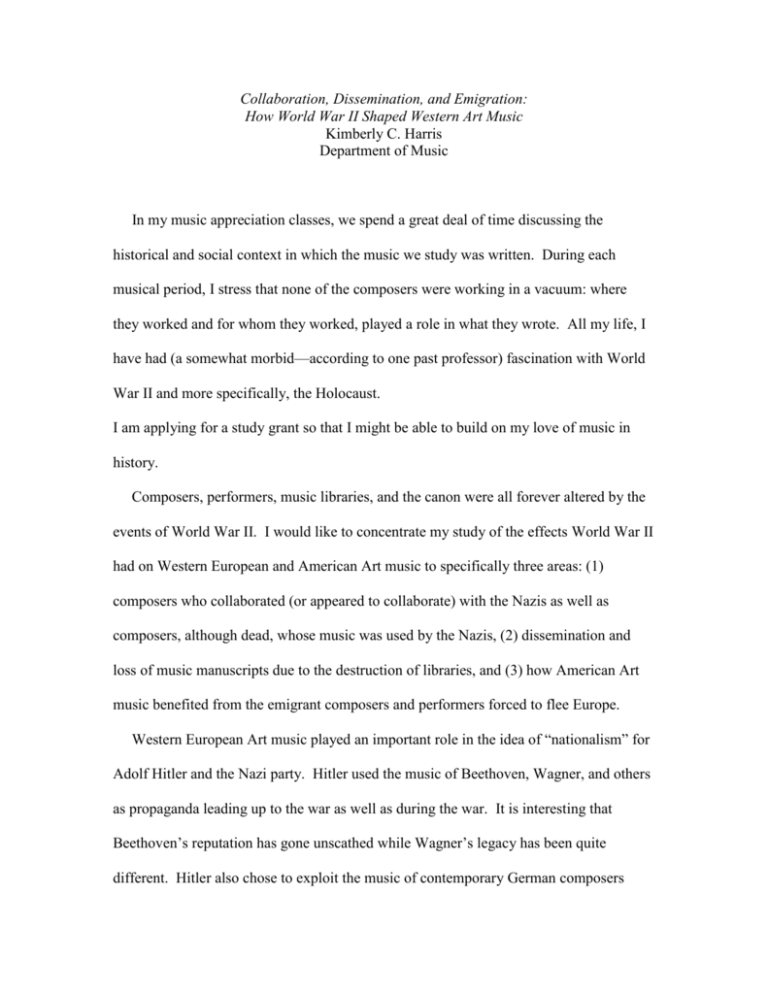
Collaboration, Dissemination, and Emigration: How World War II Shaped Western Art Music Kimberly C. Harris Department of Music In my music appreciation classes, we spend a great deal of time discussing the historical and social context in which the music we study was written. During each musical period, I stress that none of the composers were working in a vacuum: where they worked and for whom they worked, played a role in what they wrote. All my life, I have had (a somewhat morbid—according to one past professor) fascination with World War II and more specifically, the Holocaust. I am applying for a study grant so that I might be able to build on my love of music in history. Composers, performers, music libraries, and the canon were all forever altered by the events of World War II. I would like to concentrate my study of the effects World War II had on Western European and American Art music to specifically three areas: (1) composers who collaborated (or appeared to collaborate) with the Nazis as well as composers, although dead, whose music was used by the Nazis, (2) dissemination and loss of music manuscripts due to the destruction of libraries, and (3) how American Art music benefited from the emigrant composers and performers forced to flee Europe. Western European Art music played an important role in the idea of “nationalism” for Adolf Hitler and the Nazi party. Hitler used the music of Beethoven, Wagner, and others as propaganda leading up to the war as well as during the war. It is interesting that Beethoven’s reputation has gone unscathed while Wagner’s legacy has been quite different. Hitler also chose to exploit the music of contemporary German composers such as R. Strauss. I would like to spend weeks 1-6 reading books and articles that speak to Hitler’s friendship with the Wagner family, his fascination with Beethoven, as well as how the Strauss family fared during the war. Also, how has the music of these gentlemen been received by later generations, especially in countries like Israel? Untold numbers of music manuscripts were either lost or destroyed due to allied bombing and/or Nazi book burnings. How does this effect scholarship and performance today? I would like to spend weeks 7-9 reading articles regarding the dissemination of music due to the loss of so many manuscripts. How, if at all, does dissemination (or lack thereof) affect the canon, performance practice and complete works editions? Finally, I would like to study the benefits of the war on the art music “scene” in America. The United States, historically, has been considered to be the less talented, always somewhat behind, little brother so to speak compared to Europe regarding all things art music. American composers and performers who wanted to be taken seriously, always studied in Europe. World War II forced major European composers like Stravinsky and Schoenberg to flee to the United States. How did their arrival (as well as others) change the landscape of American Art music? I would like to spend weeks 10-16 reading biographies, articles and books that focus on how emigrant composers made a living in the United States. Also, many of these composers were also conductors; how does the canon change in the United States due to their influence? I believe that this study grant would allow me to bring the connection of Western Classical Art music and history to a place where my students can better understand how all aspects of society are connected. Yes, we discuss in class the effects of the Hundred Years War and the Thirty Years War on music; however, it is difficult to bring that into a perspective they really understand because (1) those wars are so far in the past and (2) those wars have no direct connection to the United States in the manner that World War II does. I believe that I would be able to better show how global events affect cultures on a very basic level. After completing the study, I would like to present a lecture as a Visiting Scholar for S.A.I.L. Bibliography Brown, Julie, ed. Western Music and Race. Cambridge: Cambridge University Press, 2007. Bullock, Alan. Hitler: A Study in Tyranny. New York: Harper & Row, 1964. Cross, Charlotte M., and Russell A. Berman. Political and Religious Ideas in the Works of Arnold Schoenberg. New York: Garland, 2000. Fenelon, Fania. The Musicians of Auschwitz. Translated by Judith Landry. London: Michael Joseph, 1977. Flam, Gila. Singing for Survival: Songs of the Lodz Ghetto, 1940-1945. Urbana, IL: University of Illinois Press, 1992. Fleming, Gerald. Hitler and the Final Solution. Berkeley: University of California Press, 1982. Gilbert, Martin. The Holocaust: A History of the Jews of Europe During the Second World War. New York: Henry Holt, 1985. Goldsmith, The Inextinguishable Symphony: A True Story of Music and Love in Nazi Germany. New York: John Wiley and Sons, Inc., 2000. Gutman, Israel, ed. Encyclopedia of the Holocaust. New York: Macmillan, 1994. Horowitz, Joseph. Artists in Exile: How Refugees from Twentieth-Century War and Revolution Transformed the American Performing Arts. Scranton, PA: Harper Collins, 2009. Jacobson, Joshua. "Music in the Holocaust." The Choral Journal 36:5 (December, 1995): 9-21. Kater, Michael. Composers of the Nazi Era: Eight Portraits. Oxford: Oxford University Press, 2000. Kater, Michael. The Twisted Muse: Musicians and Their Music in the Third Reich. New York: Oxford University Press, 1997. Levi, Erik. Music in the Third Reich. London: Macmillan, 1994. Moricz, Klara. Jewish Identities: Nationalism, Racism, and Utopianism in Twentieth-Century Music. Berkeley: University of California Press, 2008. Rovit, Rebecca, and Alvin Goldfarb, eds. Theatrical Performance During the Holocaust. Baltimore: The Johns Hopkins University Press, 1999. Steinweis, Alan E. Art, Ideology, and Economics in Nazi Germany: The Reich Chambers of Music, Theatre, and the Visual Arts. Chapel Hill: University of North Carolina Press, 1993. Wagner, Gottfried. Twilight of the Wagners: The Unveiling of a Family’s Legacy. New York: Picador, St. Martin’s Press, 1999.
